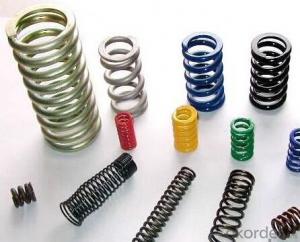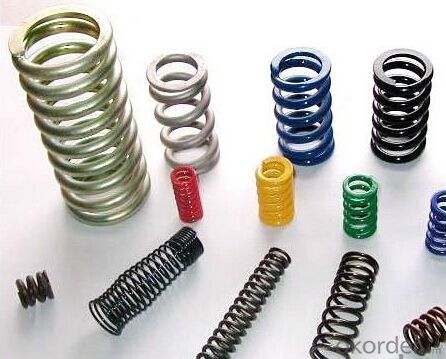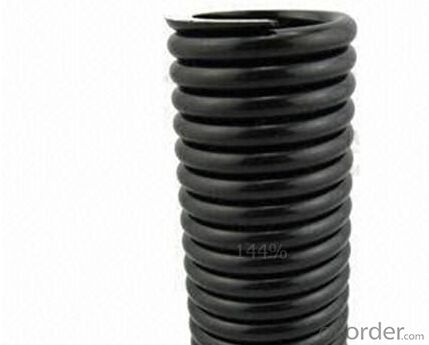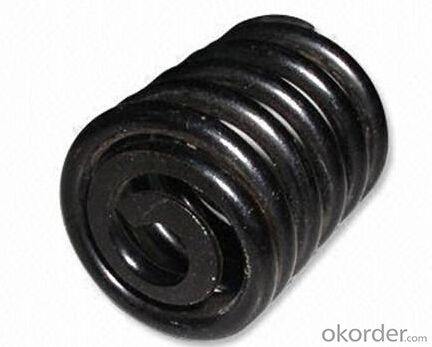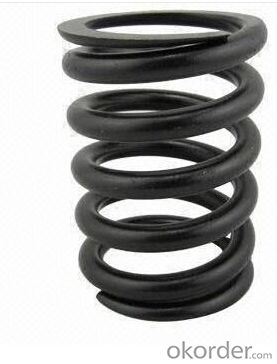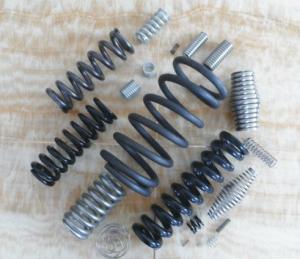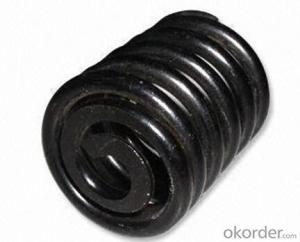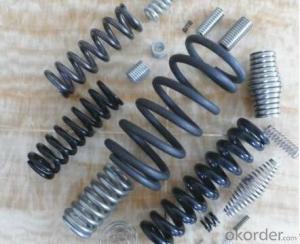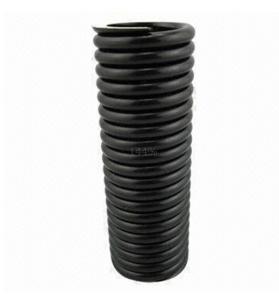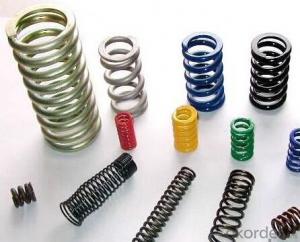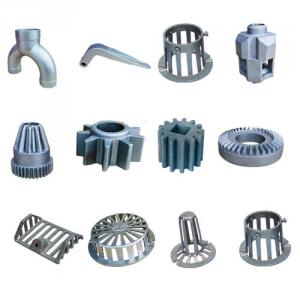Spring Precision and Compression with Stainless Steel
- Loading Port:
- China Main Port
- Payment Terms:
- TT or LC
- Min Order Qty:
- 50 m.t.
- Supply Capability:
- 1000 m.t./month
OKorder Service Pledge
OKorder Financial Service
You Might Also Like
Product Description:
OKorder is offering Spring Precision and Compression with Stainless Steel at great prices with worldwide shipping. Our supplier is a world-class manufacturer of steel, with our products utilized the world over. OKorder annually supplies products to European, North American and Asian markets. We provide quotations within 24 hours of receiving an inquiry and guarantee competitive prices.
Product Applications:
Spring Precision and Compression with Stainless Steel are ideal for structural applications and are widely used in the construction of buildings and bridges, and the manufacturing, petrochemical, and transportation industries.
Product Advantages:
OKorder's Spring Precision and Compression with Stainless Steel are durable, strong, and resist corrosion.
Main Product Features:
· Premium quality
· Prompt delivery & seaworthy packing (30 days after receiving deposit)
· Corrosion resistance
· Can be recycled and reused
· Mill test certification
· Professional Service
· Competitive pricing
Specifications of Precision Compression Spring:
ISO9001 certificate
Wire diameter: 0.15mm to 7.0mm
Material: stainless steel, swc,swp
Engine valve spring
We have the CNC computer spring machine, non-cam and non-rocker, independent control by multiple servo motor, which can produce the biggest diameter spring. Fast production, precision positioning, steady operation. | |
Wire diameter: | 0.08mm-10mm. Size and style are made by drawings. |
Materials: | adopt the domestic and imported swc, sus, swp, mild steel wire, manganese steel wire, phosphorus copper wire, nickel-plated wire, zinc-plated wire, tin-plated copper wire, nickel-plated steel wire, non-magnetic stainless steel wire, heat-resistant steel wire, duplex stainless steel wire(corrosion resistant and heat resistant steel wire), bronze, copper, phosphorus copper, beryllium copper. Alloy steel has 60Si2MNA, 60Si2CRVA, 55CrSi. |
Surface treatment: | plate gold, silver, white, red yellow, blue, green, purple, black, etc., salt spray test more than 100 H. Appearance beautiful and bright. |
Application: | electronics, electrical appliances, toys, locks, stationery, furniture, washing machines, vacuum cleaners, lamps and lanterns, stroller, bicycle, gift, handicraft, gifts, cameras, printers, office equipment, precision equipment, all kinds of transportation, car accessories, sports equipment, switches, sockets, water heater, calculator, watches, ignition, mouse, motor, mobile phone, mementoes, fan, video DVD, etc |
Usage/Applications
We import the most sophisticated computer compression spring machine from Taiwan; it can do 100 percent inspection to spring length, which ensured the spring quality stable and precise
Widely used in automobiles, motorcycles, electrical appliances, telecommunication, communication, aviation, space and other civil fields
Packaging & Delivery
Inner packing: plastic or PE bags
Outer packing: corrugated cartons, wooden boxes or pallets
Testing equipment
We have a andvanced testing equipment to gueranteen the good quanlity of our products.
FAQ:
Q1: Why buy Materials & Equipment from OKorder.com?
A1: All products offered byOKorder.com are carefully selected from China's most reliable manufacturing enterprises. Through its ISO certifications, OKorder.com adheres to the highest standards and a commitment to supply chain safety and customer satisfaction.
Q2: How do we guarantee the quality of our products?
A2: We have established an advanced quality management system which conducts strict quality tests at every step, from raw materials to the final product. At the same time, we provide extensive follow-up service assurances as required.
Q3: How soon can we receive the product after purchase?
A3: Within three days of placing an order, we will begin production. The specific shipping date is dependent upon international and government factors, but is typically 7 to 10 workdays.
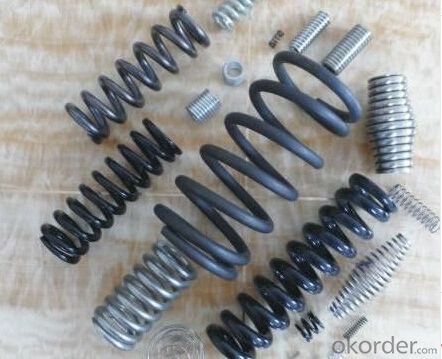
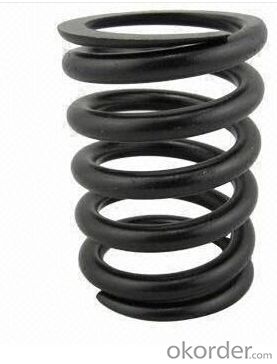
- Q: What are the main characteristics of high-speed steel?
- High-speed steel (HSS) possesses exceptional properties that make it widely used in machining applications. HSS is characterized by its superior hardness, achieved through the addition of alloying elements such as tungsten, molybdenum, cobalt, vanadium, and chromium. This hardness allows HSS to withstand high temperatures and resist wear. Another notable characteristic of high-speed steel is its excellent heat resistance, enabling it to maintain its hardness and strength even at elevated temperatures. This is crucial in applications where the tool needs to endure high cutting speeds and generate significant amounts of heat. HSS also demonstrates good toughness, resisting cracking and chipping under heavy loads or impact. This ensures the tool's ability to withstand demanding cutting conditions without premature failure. Furthermore, high-speed steel exhibits high wear resistance, making it suitable for cutting, drilling, and milling operations. It retains its sharpness and performance even with prolonged usage, resulting in extended tool life. High-speed steel is highly versatile and can be used for cutting, shaping, and forming various materials such as metals, plastics, and wood. Its versatility makes it a popular choice in industries like manufacturing, automotive, aerospace, and construction. Additionally, HSS can be easily machined and shaped into different tool designs, allowing for customization and optimization based on specific applications. This makes it a preferred material for manufacturing cutting tools like drills, end mills, taps, and saw blades. Compared to other high-performance tool materials like carbide, high-speed steel is relatively more cost-effective. It strikes a balance between performance and affordability, making it a cost-efficient choice for many machining applications. In conclusion, high-speed steel is highly valued for its exceptional hardness, heat resistance, toughness, wear resistance, versatility, ease of machining, and cost-effectiveness. These characteristics make it a preferred material for a wide range of cutting tools, ensuring efficient and reliable machining operations.
- Q: What are the different welding techniques used for special steel?
- There are several welding techniques used for special steel, including gas metal arc welding (GMAW), shielded metal arc welding (SMAW), flux-cored arc welding (FCAW), and tungsten inert gas welding (TIG). These techniques are chosen based on factors such as the type of special steel, its thickness, and the desired weld characteristics. Each technique has its own advantages and limitations, and the selection depends on the specific requirements of the welding application.
- Q: Can special steel be used in the battery manufacturing industry?
- Yes, special steel can be used in the battery manufacturing industry. Special steel alloys with specific properties, such as high corrosion resistance, high strength, and good conductivity, are often utilized in battery manufacturing. These alloys are utilized in various components of the battery, including terminals, contacts, and current collectors, to enhance the overall performance and efficiency of the battery.
- Q: How does special steel contribute to the wear resistance of products?
- Special steel contributes to the wear resistance of products by offering superior hardness, strength, and durability compared to regular steel. Its unique composition, which may include additional alloying elements like chromium, nickel, or molybdenum, enhances its ability to withstand friction, abrasion, and other forms of wear. This enables products made from special steel to have a longer lifespan and perform effectively in demanding applications, reducing the need for frequent replacements and maintenance.
- Q: How does special steel perform in molding applications?
- Special steel is highly preferred in molding applications due to its exceptional properties and performance. Firstly, special steel possesses excellent hardness and wear resistance, making it highly resistant to deformation and wear during the molding process. This ensures that the steel maintains its shape and integrity, even when subjected to high pressure and temperature. Moreover, special steel has excellent thermal conductivity, which allows for efficient heat transfer during the molding process. This helps in achieving uniform heating and cooling of the mold, resulting in consistent and high-quality molded products. Additionally, the high thermal conductivity of special steel also aids in reducing cycle times, thereby increasing productivity. Furthermore, special steel exhibits superior corrosion resistance, preventing any chemical reactions or rusting that may occur during the molding process. This ensures that the steel remains durable and long-lasting, even when exposed to moisture or corrosive substances. In terms of machinability, special steel is easily workable, allowing for precise and intricate mold designs. This enables the production of complex and detailed molded products with high accuracy and dimensional stability. Lastly, special steel offers excellent strength and toughness, making it highly resistant to cracking or fracturing under high stress conditions. This ensures the longevity and reliability of the mold, reducing the need for frequent repairs or replacements. Overall, the exceptional properties of special steel, including hardness, wear resistance, thermal conductivity, corrosion resistance, machinability, and strength, make it an ideal choice for molding applications. It guarantees high-quality and consistent molded products, increased productivity, and a longer lifespan for the molds.
- Q: How does special steel enhance the durability of products?
- Special steel enhances the durability of products by providing them with superior strength, hardness, and resistance to corrosion and wear. Its unique composition and manufacturing processes result in a material that can withstand high pressure, extreme temperatures, and harsh environments, making it ideal for applications where regular steel would fail. This enhanced durability ultimately leads to longer product lifespans, increased reliability, and reduced maintenance costs.
- Q: What is the hardness of special steel?
- The hardness of special steel can vary depending on its composition and specific heat treatment, but generally, special steel is known for its high hardness and excellent strength properties.
- Q: Can special steel be used in the production of consumer goods?
- Yes, special steel can be used in the production of consumer goods. Special steel refers to steel alloys that have been specifically formulated to have unique properties, such as high strength, corrosion resistance, or heat resistance. These properties make special steel suitable for a wide range of consumer goods that require durability, strength, or resistance to wear and tear. For example, special steel can be used in the production of kitchen appliances like knives and cookware, where high strength and corrosion resistance are important. It can also be used in the manufacturing of consumer electronics, such as smartphones and laptops, where the steel may be used in the casing or internal components to provide structural integrity and protection. Furthermore, special steel is commonly used in the automotive industry for the production of various consumer goods like bicycles, motorcycles, and cars. The steel's high strength and lightweight properties make it ideal for creating strong and durable vehicle frames, engine components, and other parts. In summary, special steel can indeed be used in the production of consumer goods, as its unique properties make it suitable for applications where strength, durability, and resistance to corrosion or wear are essential.
- Q: Can special steel be used in the marine industry?
- Yes, special steel can be used in the marine industry. Special steel, such as stainless steel or corrosion-resistant steel, is often preferred in marine applications due to its high resistance to corrosion from saltwater and harsh environmental conditions. It is commonly used in the construction of ships, offshore structures, and marine equipment to ensure durability and longevity.
- Q: What are the different methods for improving the wear resistance of special steel?
- There are several methods for improving the wear resistance of special steel. Some common techniques include heat treatment processes such as quenching and tempering, which can increase the hardness and toughness of the steel. Another method is surface coating, where a thin layer of a wear-resistant material like carbides or ceramics is applied to the steel surface. Additionally, alloying the steel with elements like chromium, vanadium, or tungsten can enhance its wear resistance properties. Finally, precision machining and grinding can be used to achieve a smoother surface finish, reducing friction and wear.
Send your message to us
Spring Precision and Compression with Stainless Steel
- Loading Port:
- China Main Port
- Payment Terms:
- TT or LC
- Min Order Qty:
- 50 m.t.
- Supply Capability:
- 1000 m.t./month
OKorder Service Pledge
OKorder Financial Service
Similar products
Hot products
Hot Searches
Related keywords
